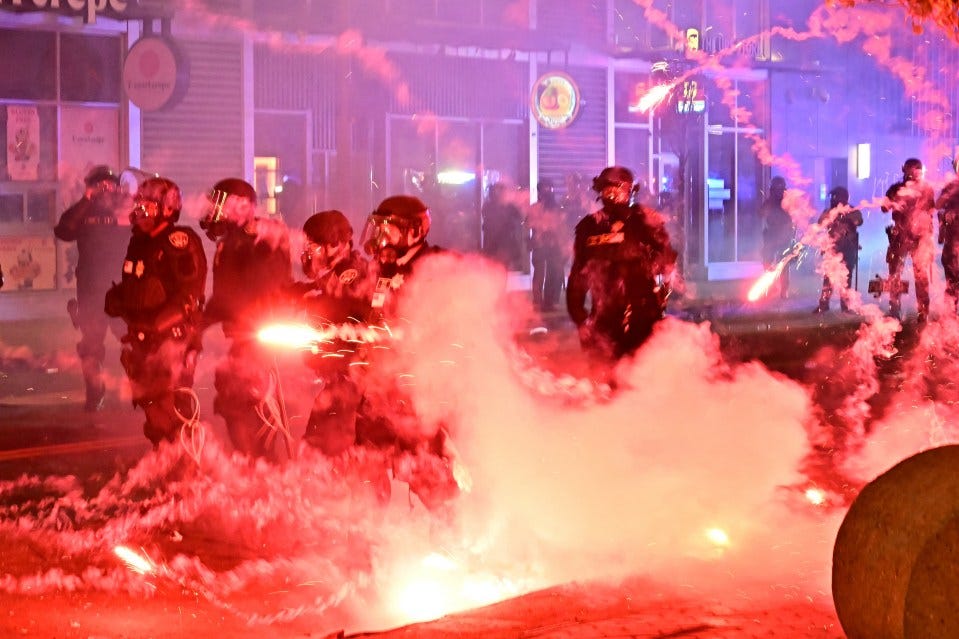When the Military Becomes a Prop: What Trump’s Deployment in LA Really Means
Unlawful Troop Deployments Threaten the Foundations of Civil Liberties
In American democracy, there is a sacred principle: civilian control of the military. It’s the bedrock guardrail that keeps the armed forces in their lane, ensuring soldiers don’t govern, generals don’t patrol protests, and the military doesn’t take sides in politics.
But what happens when that guardrail is deliberately blurred? When the president treats active-duty troops not as protectors of the people but as political props in a theater of intimidation?
On June 8th, 2025, President Donald Trump deployed active-duty Marines into the streets of Los Angeles against the express wishes of California’s elected leaders. This was not a call from Governor Newsom or Mayor Bass but a unilateral federal decision. Not only the National Guard or federal law enforcement, but also combat troops trained for war zones, not protests.
This extraordinary action, unlike anything we've seen in recent history, carries significant risks and demands serious consideration.
The protests in LA that day were large but largely peaceful demonstrations against expanded ICE raids—marked by tense moments, but nothing close to the chaos or violence that once justified military intervention, such as the 1992 Rodney King riots. That crisis erupted into widespread fires, looting, and deadly violence. At the time, California’s leaders requested federal help.
The question that naturally arises is: Why send the Marines when the situation did not call for such drastic measures?
This wasn’t about public safety or restoring order. It was about sending a message: “We will assert control by any means necessary.”
Trump’s show of military muscle wasn’t subtle. It was a warning shot aimed at any city, any governor, any movement that dares to defy the federal government’s agenda, especially on immigration enforcement. Don’t want to cooperate with ICE raids? Here’s a Marine battalion stationed outside your courthouse. Don’t want your city to become an extension of federal immigration control? Then, prepare for federal forces to enforce compliance.
This is law and order as spectacle and domination, not protection.
And it comes at a steep cost.
The U.S. military is supposed to be apolitical, serving the nation, not a party or a single leader.
Sending federal troops into domestic areas without approval from state leadership directly contradicts the Posse Comitatus Act, a law designed to limit military involvement in civilian law enforcement. Deploying federal troops within a state without the consent of its local leaders violates the Posse Comitatus Act, which restricts the military from engaging in law enforcement activities. Because the Insurrection Act, which allows for certain exceptions, was not invoked in this case, the deployment raises serious constitutional questions.
More than legality, it erodes a vital democratic norm: the military’s distance from partisan power struggles. When the armed forces are weaponized for political theater, they lose their role as protectors of the people and become tools of coercion.
And once that line is crossed, it’s not easily restored.

We are entering uncharted democratic territory. Normalizing active-duty military presence in American cities during peacetime, without state consent, signals a dangerous shift toward authoritarian impulse masked as governance.
This isn’t just about Los Angeles or immigration protests. It’s about whether we still believe in the fundamental principle of civilian control of the military. Whether we accept that democracy requires limits on the use of force within our borders.
If we let that principle erode, we risk blurring the line between democracy and dominance, where dissent is met not with dialogue but with guns.
And that should alarm every American who values their freedoms.
The question that naturally arises is: Why send the Marines when the situation did not call for such drastic measures? This wasn’t about public safety or restoring order. It was about sending a message: “We will assert control by any means necessary.”
Trump’s show of military muscle wasn’t subtle. It was a warning shot aimed at any city, any governor, any movement that dares to defy the federal government’s agenda, especially on immigration enforcement. Don’t want to cooperate with ICE raids? Here’s a Marine battalion stationed outside your courthouse. Don’t want your city to become an extension of federal immigration control? Then, prepare for federal forces to enforce compliance.
This is law and order as spectacle and domination, not protection. And it comes at a steep cost. The U.S. military is supposed to be apolitical, serving the nation, not a party or a single leader.
Sending federal troops into domestic areas without approval from state leadership directly contradicts the Posse Comitatus Act, a law designed to limit military involvement in civilian law enforcement. Deploying federal troops within a state without the consent of its local leaders violates the Posse Comitatus Act, which restricts the military from engaging in law enforcement activities. Because the Insurrection Act, which allows for certain exceptions, was not invoked in this case, the deployment raises serious constitutional questions.
More than legality, it erodes a vital democratic norm: the military’s distance from partisan power struggles. When the armed forces are weaponized for political theater, they lose their role as protectors of the people and become tools of coercion.
And once that line is crossed, it’s not easily restored.
The United States is entering uncharted democratic territory. Normalizing active-duty military presence in American cities during peacetime, without state consent, signals a dangerous shift toward authoritarian impulse masked as governance. This isn’t just about Los Angeles or immigration protests. It’s about whether Americans still believe in the fundamental principle of civilian control of the military. Whether Americans accept that democracy requires limits on the use of force within American borders.
If the U.S allows that principle to erode, it risks blurring the line between democracy and dominance, where dissent is met not with dialogue but with guns.
And that should alarm every American who values their freedoms.



